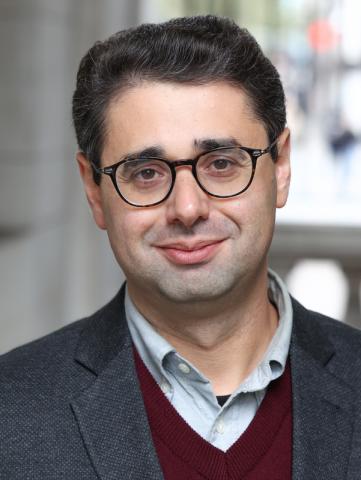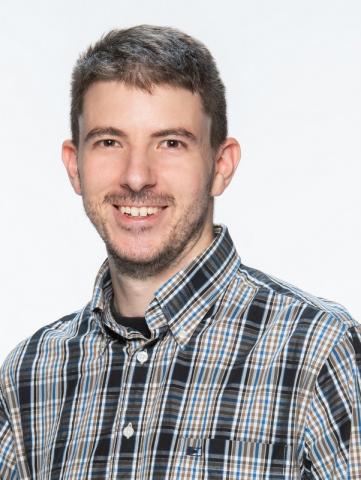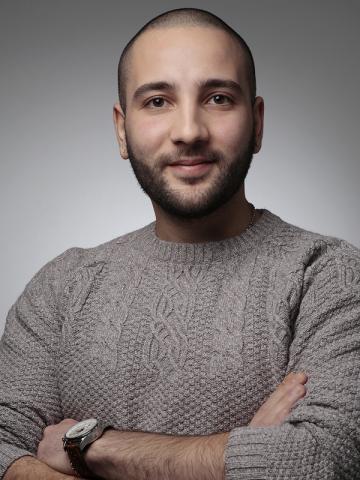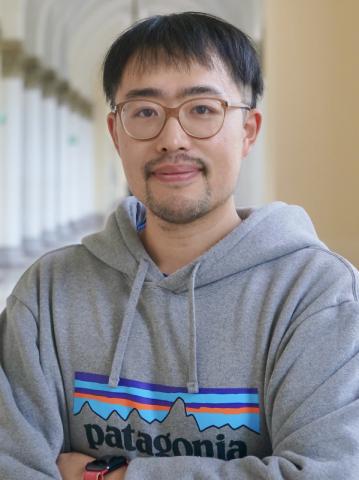The Crisis, Security and Conflict Communication (CRI) Working Group will be holding online elections for two vice-chair positions, for the term 2025 - 2029.
The elections will be held online from 7 to 21 May using the SurveyMonkey platform.
Individual members and representatives of institutional members in good standing, who are also registered as members of the Crisis, Security and Conflict Communication Working Group by 5 May, are eligible to vote. Voters will receive a voting link on 7 May.
To verify if you are a member of the CRI Working Group, log in to your IAMCR account and select “My Sections and Working Groups” from the menu.
Read about the Crisis, Security and Conflict Communication Working Group
More information and timeline at https://iamcr.org/s-wg/elections2025
Candidates
Statements

Gregory Asmolov, Department of Digital Humanities, King’s College London
I am a Lecturer in Global Digital Politics in the Department of Digital Humanities at King’s College London.
I have been attending IAMCR since 2013 and have always considered it one of my top conference choices, particularly due to the existence of the CRI section. CRI has offered an inspiring environment to receive critical feedback on my research and to develop new collaborations. For the past several years, I have continuously participated in peer-reviewing submissions for the section.
Thanks to the support of Dr. Virpi Salojärvi, Dr. Paul Reilly, Dr. Rikke Jensen, and other amazing colleagues, I have been able to contribute to two special issues and a number of additional fascinating projects. I find it impressive how CRI ensures that conference presentations lead to tangible, specific outcomes. I am particularly drawn to the group’s cross-cultural comparative approach and its capacity to address the most pressing socio-political challenges we face globally.
My dissertation project, defended in 2016 at LSE under the supervision of Professor Robin Mansell, focused on a comparative analysis of crowdsourcing crisis-related deployments in Australia and Russia. It explored the socio-political factors that shape the role of digital platforms in responding to natural disasters. My current research covers a broad range of issues related to the role of social media in contemporary conflicts, with a focus on critically exploring digital innovation for participation in wars and social resilience in the face of external threats. Among various undergraduate and postgraduate courses, I teach crisis and strategic communication, as well as modules dedicated to social media and protest.
I am also particularly interested in building bridges between the community of policy-makers, crisis-related practitioners and academia. Since 2010, I have been a member of the crisis mapping community and a co-founder of several crowdsourcing deployments aimed at facilitating mutual aid during disasters — including a “Help Map” in response to Russian wildfires in 2010 and a “Radiation Map” in response to the Fukushima disaster in 2011. Before beginning my academic journey in 2008, I worked as a journalist covering news related to conflicts and security.
I believe CRI offers a unique opportunity to support research that addresses today’s most significant challenges by providing an inclusive and interdisciplinary environment. If selected as vice-chair, I plan to continue supporting the group’s activities in a way that provides opportunities for a wide range of scholars, including PhD students and early career researchers. I also want to ensure that the group continues to develop projects presented at conferences into special issues, edited volumes, and other publications that expand the visibility and impact of CRI’s work. I will ensure CRI remains a key platform for presenting critical research on a broad spectrum of issues, including conflicts, natural disasters, emerging global catastrophic risks, organizational crises and other relevant topics while providing space for research focused on gender, as well as non-Western and authoritarian contexts.
For more information, please visit my website: gregoryasmolov.com.

Minos-Athanasios Karyotakis, David C. Lam Institute for East-West Studies (LEWI), Hong Kong Baptist University
I am a Post-Doctoral Research Fellow at the David C. Lam Institute for East-West Studies (LEWI) at Hong Kong Baptist University (HKBU). Currently, I am researching environmental disasters, such as wildfires and water pollution, as well as the impact of the Belt and Road Initiative (BRI) around the globe and the South China Sea dispute as part of the work project regarding global territorial name disputes, which is an outcome of my monograph Populism, Territories, Name Disputes, and Hyperreality: Greek Nationalism and the Macedonian Case by Lexington Books.
I have been a member of CRI since 2021 and have attended almost every conference (Kenya, France, & New Zealand) ever since. CRI is a fantastic platform and my home in IAMCR with open-minded researchers and supportive academics who value different viewpoints and care about rigorous and impactful research. Thus, I started engaging more with the group and supporting its initiatives. From chairing sessions, and reviewing abstracts, to working more closely with Dr. Virpi Salojärvi and Dr. Paul Reilly to support CRI in any possible way. Also, I am currently co-editing a special issue with Dr. Virpi based on the papers presented at CRI last year in New Zealand.
If I am selected as vice-chair, I plan to continue working with the other chairs and colleagues to strengthen the group, support new and emerging academic voices, maintain open-mindedness and diversity, and involve more scholars from a Global North and South background.
As I am educated in both Europe and Asia and located in Hong Kong, and my research covers regions of the Global South (Asia, Middle East, and Balkan Countries) and the Global North, I hope that my addition to CRI will help strengthen it with a global mindset while pursuing academic knowledge, and promoting CRI’s work worldwide.
Among other achievements, I received the prestigious Hong Kong Ph.D. Fellowship Scheme (HKPFS) 2018/19, HKBU’s School of Communication Academic Achievement Award 2020/21 for my outstanding scholarly performance, top-paper awards by AEJMC as a Ph.D. student, and I am an Editor of Humanities & Social Sciences Communications. My research has advanced my understanding of global media politics through environmental communication, hate propaganda, media ethics, and power relations. It has been published in Journalism, Journalism Practice, Mediterranean Politics, Sustainability, Territory, Politics, Governance, Trees, Forests and People, and other venues.
For more information, please visit my website: minoskar.net.
Thank you so much for your time and participation in the electoral process. Any questions or queries please reach out to me via email: minosathkar@hkbu.edu.hk.

Mazlum Kemal Dağdelen, Culture and Communication Research Centre, Institute of Communication Studies and Journalism, Faculty of Social Sciences, Charles University
I am honoured to submit my candidacy for one of the two vice-chair positions of the Crisis, Security and Conflict Communication (CRI) Working Group of IAMCR. As an active member of CRI since 2022, I have consistently contributed to its activities by presenting papers at IAMCR conferences in Beijing, Lyon, and Christchurch, and I will continue this engagement at the upcoming conference in Singapore in 2025. Additionally, I have supported the working group by reviewing submissions, reinforcing my commitment to its scholarly community.
Beyond CRI, I have extensive experience within IAMCR. From 2020 to 2024, I worked closely with the Association as the presidential assistant to past president Nico Carpentier. In this role, I had the opportunity to engage with different IAMCR bodies, including the Executive Board and the International Council, particularly through my coordination of the IAMCR Ambassadors’ Network and the IAMCR Presidential PhD Research Webinar Series. These responsibilities deepened my understanding of IAMCR’s organisational structure and reinforced my dedication to fostering international academic collaboration.
My academic background aligns closely with the themes of CRI. I am in the final stages of my PhD, which I expect to complete by September 2025. I currently serve as the coordinator of the Culture and Communication Research Centre (CULCORC) at the Institute of Communication Studies and Journalism, Faculty of Social Sciences, Charles University in Prague. My research focuses on crisis, war and conflict, trauma, and nationalism studies. Additionally, I teach the course Media and Conflict in Europe as part of the Media and Area Studies Master’s Programme, where I also supervise theses exploring crisis and conflict in diverse contexts.
If elected as vice-chair, I will work closely with the working group’s leadership and members to further strengthen CRI as a vibrant and supportive academic space. I am particularly committed to promoting interdisciplinary engagement, supporting new and emerging scholars, and fostering inclusive discussions on crisis and conflict communication. My experience within IAMCR has equipped me with the skills to facilitate knowledge exchange, encourage active participation, and contribute to the continued development of CRI as a forum for critical research in this field.
IAMCR and CRI have provided me with an intellectual home, and I am eager to give back by contributing to the working group’s growth and impact. I would be honoured to serve as vice-chair and to collaborate with colleagues to enhance CRI’s role in the IAMCR community.
I sincerely appreciate your time and involvement in the electoral process. Please feel free to reach out to me via email if you have any questions or require further information.

Zhe Xu, Ludwig Maximilian University of Munich, Germany
I am a Research Associate in the Department of Media and Communication at Ludwig Maximilian University of Munich. I am also a Principal Investigator in the German Research Foundation project ‘Humanitarian Journalism in Global Crises’. My research focuses on crisis and political communication in both authoritarian and democratic contexts. I use social science and computational methods to study global news production during humanitarian crises and its effects on policymaking and public decision-making. All of my work aims to understand the (de)politicization, platformization, and algorithmization of communicating human vulnerability.
My journey with the IAMCR CRI began five years ago when I was a second-year PhD student, nervously attending my first-ever conference—held entirely online during the pandemic. I vividly remember the excitement when I learned my paper, ‘The Ultimate Empathy Machine as Technocratic Solutionism? Audience Reception of the Distant Refugee Crisis through Virtual Reality,’ would be published in the Special Issue Mediatizations of Societal Threats in the Information Age, organized by Virpi and Paul. It wasn’t just a publication—it was my first academic paper, the moment I truly felt part of the scholarly community. That sense of validation, of finally seeing my work recognized, is something I will never forget. What I value
most about CRI isn’t just the opportunity to collaborate with Virpi and Paul—whose leadership is refreshingly free of bureaucracy—but also its remarkable diversity, particularly the contributions from scholars in the Global South. This openness, intellectual curiosity, and inclusivity make the group so special and keep me deeply connected to it.
If elected Vice Chair, I will fully support the Chair in organizing the annual conference, maintaining our academic community, and promoting the work of our members. As an early-career scholar, Asian researcher, and interdisciplinary social scientist, I am committed to three key initiatives. First, I will establish an annual Early Career Scholar Workshop, fostering collaboration, mentorship, and open discussions on challenges like mental well-being and career development. Second, I will strengthen IAMCR’s tradition of diversity, ensuring scholars from marginalized regions not only share their perspectives but actively shape discussions in our field.
Finally, I aim to organize a methodology workshop or summer school to explore how qualitative, quantitative, and computational methods can advance crisis and conflict communication research, fostering interdisciplinary collaboration. From forced displacement and climate change to global poverty and human rights violations, we
live in a world-in-crisis. Yet, conventional journalism has long mediated human vulnerability through a dehumanizing paradigm—reducing complex suffering to statistics and stripping crises of context. Meanwhile, mis/disinformation, algorithmic bias, and political polarization further distort our understanding of these urgent issues. Humanitarian and peace journalism offer a necessary shift, but they too face growing political and economic pressures. As scholars in crisis and conflict communication, we must stand together to critically engage with these challenges, ensuring our research not only analyzes crises but also contributes to solutions that promote resilience and justice.
For more information, please visit my website at www.zhexu.net or email me at zhe.xu@lmu.de.
Dr. Zhe Xu
Research Associate
Department of Media and Communication
Ludwig Maximilian University of Munich
Oettingenstraße 67, 80538 Munich, Germany
zhe.xu@lmu.de